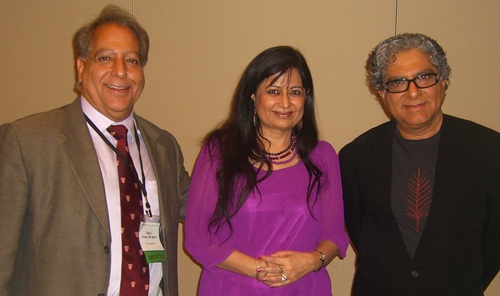 Dr. Deepak Chopra has impacted lives of millions of people through his books, workshops, seminars, talks, interviews and articles in newspapers and magazines. So much exposure has brought him not only the fame and fortune, but also plenty of criticisms and controversies. In a 2008 article in Time magazine, Chopra was called “a magnet for criticism.” But how does Dr. Chopra deal with criticisms and controversies and how does he still captivate people from all walks of life and around the world?
Dr. Deepak Chopra has impacted lives of millions of people through his books, workshops, seminars, talks, interviews and articles in newspapers and magazines. So much exposure has brought him not only the fame and fortune, but also plenty of criticisms and controversies. In a 2008 article in Time magazine, Chopra was called “a magnet for criticism.” But how does Dr. Chopra deal with criticisms and controversies and how does he still captivate people from all walks of life and around the world?
“What people say about me is none of my business. That is how I handle it. That is their business,” said Dr. Chopra in a recent interview with Chai with Manju. During the interview, he was accompanied by his younger brother Dr. Sanjiv Chopra, a professor of medicine and faculty dean of Continuing Medical Education at Harvard Medical School. Sanjiv is also an author and a public and motivational speaker on leadership and better living. The Chopra brothers have recently co-authored a book titled “Brotherhood: Dharma, Destiny, and the American Dream.”
The book is an inspiring story of two brothers who immigrated to the United States in the 1970s from India and took very different paths to becoming world-renowned healers and teachers. Having grown up in postwar India amidst the sudden freedom of the 1947 liberation, their childhood was a blend of the exotic, the mythical, and the modern. Their father was one of the first Indians to become a Western-trained cardiologist, while their extended family maintained deep roots in ancient spiritual traditions, according to the Chopras and their book promoters. During the interview, the Chopra brothers talked about their childhood, their shared and individual journeys, and the lessons they have learned in life.
After successfully completing his clinical internship and residency training at various hospitals on the East Coast during the 1970s and later becoming Chief of Staff at the New England Memorial Hospital in Stoneham, Deepak became interested in Ayurveda during a visit to India in the early 1980s. In 1985, he met Maharishi Mahesh Yogi. Maharishi had invited Deepak, board-certified in internal medicine and specializing in endocrinology, to study Ayurveda, and nothing remained the same after meeting Maharishi for the young physician.
“It was at a very critical time in my career. I had just finished training in endocrine and was working at VA in Boston and Tufts New England,” said Deepak. “It was exciting times as Opiate receptor had been discovered. People had started talking about molecules of emotion. Solomon Snyder wrote about consciousness and people not being predictable in their responses.” Deepak said that his encounter and conversation with Maharishi was the single most convincing reason that made him change his path in medicine.
“Maharishi Yogi said that we are not looking at human body as a system,” Deepak said, adding that he had thought that Ayurveda was all folklore. “We are looking at it as bits and pieces. He gave me the book Ayurveda Science by Vasant Lade. It was an unbelievable concept and it changed my thinking.”
Deepak still maintains his license to practice medicine in Massachusetts and California, but he began to devote more and more time to promote Ayurveda and alternative medicine. He was one of the founders and first president of the American Association of Ayurvedic Medicine and was named director of the Maharishi Ayurveda Health Center for Stress Management and Behavioral Medicine. Deepak has written 75 books and some of them have been on the New York Times’ best sellers list. Some of the books that made him famous include “The Seven Spiritual Laws of Success” (1994), “Ageless Body Timeless Mind” (1995), and “The Soul of Leadership” (2008), among others.
Despite his varied interests and projects, Deepak still insists the main focus of his career is still health and medicine. “It is basically expansion of the same things. Fundamentally, I am a doctor of medicine, which I expanded into mind and body medicine and consciousness as part of healing,” Deepak said. “I have never abandoned medicine but included and transcended with all my projects.”
Sanjiv (left) and Deepak Chopra
During the interview, Deepak also distanced himself from the so-called religion of positive thinking and the so-called law of attraction, which were popularized after the publication of the self-help book “The Secret” in 2006 by Rhonda Byrne. The book and the movie with the same claim that positive thinking and law of attraction can change one’s life and bring wealth, health, happiness or anything one wishes—and all with positive thinking. “I am not a fan of positive thinking as such. I believe in creative thinking,” Deepak said. “But to be mindful of your thoughts and intentions that trigger behavior can be very productive.”
Deepak has been inspired and influenced by many Indian scriptures, but one that has had an enormous impact on him is Yoga Vashishtha, which is a frank and open discussion between sage Vashishtha and the teenage prince Rama who has gone into depression or a state of dejection. When asked which one was his most favorite story of Yoga Vashishtha, he said when young Rama (born as God) is sent to sage Vashishtha for study. When Rama meets Vashishtha, he bends down to touch the sage’s feet. “Rama is stopped by Vashishtha, who tells Rama ‘you are God,'” said Deepak. “To this, Rama replies that I may be God but I have forgotten, and so I have come to learn.” Learning is important and it must continue, said Deepak.
As a student and scholar of human mind, body and consciousness and achiever of numerous accolades, Deepak does not identify with any achievement that would be closest to his heart. “I believe that achievement is a journey and not a destination,” said Deepak, and then quickly added, “Though nowadays when I look at my grandchildren then I think of them as my biggest achievements.”
Deepak’s younger brother, Sanjiv, also has a sort of similar story but with a different twist. One Saturday afternoon when Sanjiv was 12 he fell asleep while reading a book. He woke up less than an hour later and found that he had lost his vision and his world was black. Extensive tests and examination did not reveal the cause of his blindness. The doctors located his physician dad who was serving at that time in a rural area in India, who then asked for a detailed history and was able to determine that his loss of vision was due to retrobulbar neuritis, a rare reaction to tetanus serum that he had received recently for a minor injury. He was given high dose steroids which restored his vision within a few hours. Failure to do that could have made him permanently blind.
This changed his life and also made him determined to become a doctor like his dad and help people. “If I could relive one day of my life it would be the day that I became blind and then regained my sight. I can relive the day knowing the outcome,” Sanjiv said.
Sanjiv received his honors in English literature at St. Columbus in New Delhi and went on to pursue a career in medicine. Today, he not only serves as a professor and the faculty dean of Continuing Medical Education at Harvard Medical School, but he also leads a dynamic academic Continuing Medical Education enterprise around the world, reaching out to 80,000 clinicians and 150 countries each year. In addition, he has pursued a successful writing career and has written seven books, including “Doctor Chopra Says: Medical Facts and Myths Everyone Should Know” (2010), “Live Better, Live Longer; The New Studies That Reveal What’s Really Good and Bad for Your Health” (2012), and “Leadership by Example: The Ten Key Principles of All Great Leaders” (2012). Now Sanjiv has truly brought his strength in medicine and language together through his talks and books. The most convincing reason behind writing his books, he says, is learning. “I have always felt that the best way to learn is to write about it.”
In addition to medicine, one of the most dominating themes of his books is leadership about which he often talks at seminars and symposiums. He said that his decision to write about leadership was by both choice and chance.
“Twelve years ago, I became the faculty dean of Continuing Medical Education at Harvard Medical School, overseeing 275 post graduate courses. It was a position of considerable leadership and I felt compelled to read about it,” said Sanjiv. “I read over 300 books and did many courses to learn about it.” Right now, Sanjiv is working with his seven-year-old granddaughter Aanya to write a kids’ book for leadership. In addition, he has started discussions with Harvard University regarding opening a leadership institute. And of all the world leaders who have impressed him most are Mahatma Gandhi, Nelson Mandela and Abraham Lincoln.
In medicine, Sanjiv said his professor Dr. Eli Schimmel changed the way he thought about medicine. “As a young resident I was presenting a case to him in the morning rounds and put an abdominal X-ray on screen,” Sanjiv recalled. “Before I could tell him any history about the patient, he told me that he could guess some of the patient’s medical problems just by looking at the X-ray and with no background information or history.”
He then elaborated that the patient could have five major problems: smoking from looking at his hyper inflated lungs, alcoholic because of pancreatic calcification, gall bladder issues due to anterior rim calcification or porcelain gall bladder that has 60 percent risk of cancer, and also diabetic due to calcification of vas deferens that most commonly is due to diabetes in the western world and in the east due to tuberculosis, and lastly he mentioned the patient had polio as a child due to kypho scoliosis curvature of spine. “I have never forgotten that,” said Sanjiv. He also recounted his recent experience as a patient when he had total hip replacement in December 2012. “In February (this year) I was doing well and playing golf. One night I had a sudden high fever and pain and talked to my doctor Dr. Andrew Friedburg who diagnosed me with an infection. Next morning, I was in the operating room for surgery followed by months of antibiotics,” Sanjiv said. “In spite of that I feel that I am the luckiest guy in the world because I live in Boston and have such a good support system and best in medicine. I told that to my surgeon and said to him that was I was lucky that I was in Boston at that time and not in New Zealand.” And his surgeon replied touchingly that even if he was travelling in New Zealand at the time, he would have flown to Boston for Sanjiv.
But what has been the inspiration behind the latest book “Brotherhood” jointly written by the Chopra brothers?
“I have written seven books and Deepak has written 75 books. We come from a family of amazing story tellers. All my uncles were great story tellers. I have written this book for my grandchildren,” said Sanjiv. Deepak echoed his brother’s views, but then added, “It is all of what Sanjeev said, and for my grandchildren. But it also about a life-long question of identity.” Throughout the interview, both brothers agreed on almost everything, but when asked about age-old sibling rivalry, they laughed. Deepak said: “No. He (Sanjiv) took care of the body and I took care of the mind and spirit. The only rivalry we had was when it came to cricket.” Sanjiv added: “I do not have a single fiber of jealousy in me. My heart swells with pride every time Deepak achieves something.”
When asked if they could go back in time and fix something in life then what would that be? Both simultaneously responded that given a chance they would love to spend time with their parents and would tell them how much they loved them. But then, Deepak calmly added: “I would fix those days of brief experimentation with smoking, drinking and even trying LSD at age 19.” LSD, or Lysergic Acid Diethylamide, is a psychedelic drug known for its psychological effects that can include altered thinking and hallucination.
Deepak once again went back to Mahesh Yogi when asked if there was something that someone had said to him that had changed his life. He responded: “Maharishi Yogi asked—Do you know who you are?”
Before the interview ended, we had a series of rapid questions for both brothers and they participated with tremendous enthusiasm and smiles. While Deepak named rain forests of Costa Rica as his most favored travel destination, Sanjiv said his was New Zealand and India’s Gomukh, where India’s divine river Ganges originates. Snajiv named Pakeeza and Doctor Zhivago as his favorite movies, and Deepak said that he does not watch Bollywood movies anymore but had fond memories of the movie Umrao Jaan and its actress Rekha. Sanjiv said Meena Kumari was his favorite actress.
Deepak named his most favorite song “Imagine” a song composed and sung by John Lennon whose lyrics encourage the listener to imagine a world at peace without the divisiveness. Sajiv’s song is: Lara’s theme from Doctor Zhivago. Regarding food, Deepak said he is not too much into food but right now he is enjoying every species of mushrooms from around the world, and was promptly warned by his brother, who specializes in liver diseases, about poisonous mushrooms that cause liver failure. Sanjiv said his favorite food has always been biryani and lotus root sabzi. Sanjiv named his wife as his best friend while Deepak named Rudolph Tanzi, the Joseph P. and Rose F. Kennedy Professor of Neurology at Harvard Medical School.
Deepak said his favorite quote is Isaac Newton’s “I was like a boy playing on the sea-shore, and diverting myself now and then finding a smoother pebble or a prettier shell than ordinary, whilst the great ocean of truth lay all undiscovered before me.” And Sanjiv quoted singer John Lennon: “When I was 5 years old, my mother always told me that happiness was the key to life. When I went to school, they asked me what I wanted to be when I grew up. I wrote down •happy’. They told me I didn’t understand the assignment, and I told them they didn’t understand life.”
And on the last word on Chai with Manju, Sanjiv said: “I love masala chai,” and Deepak said: “Take it easy.”

